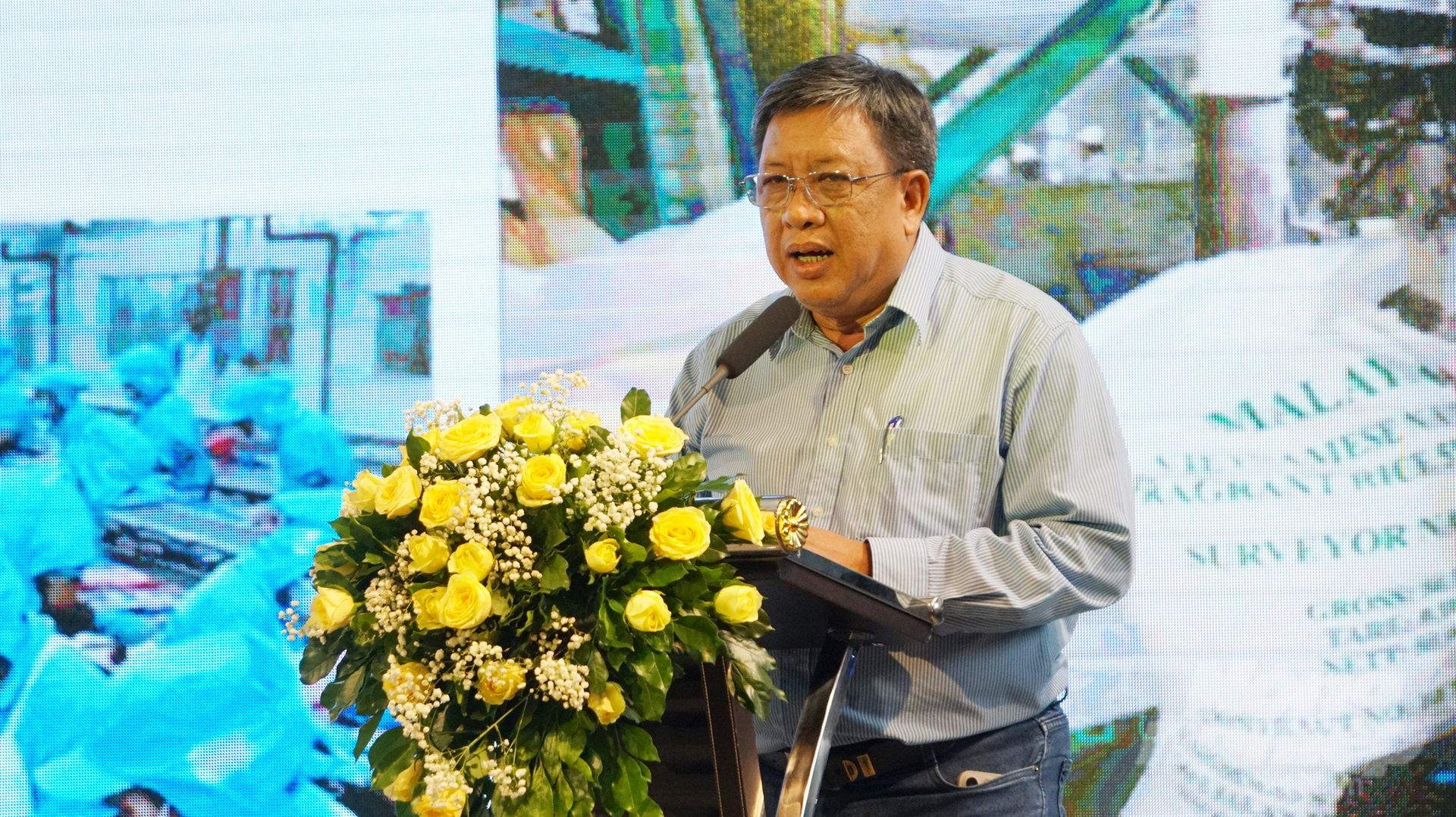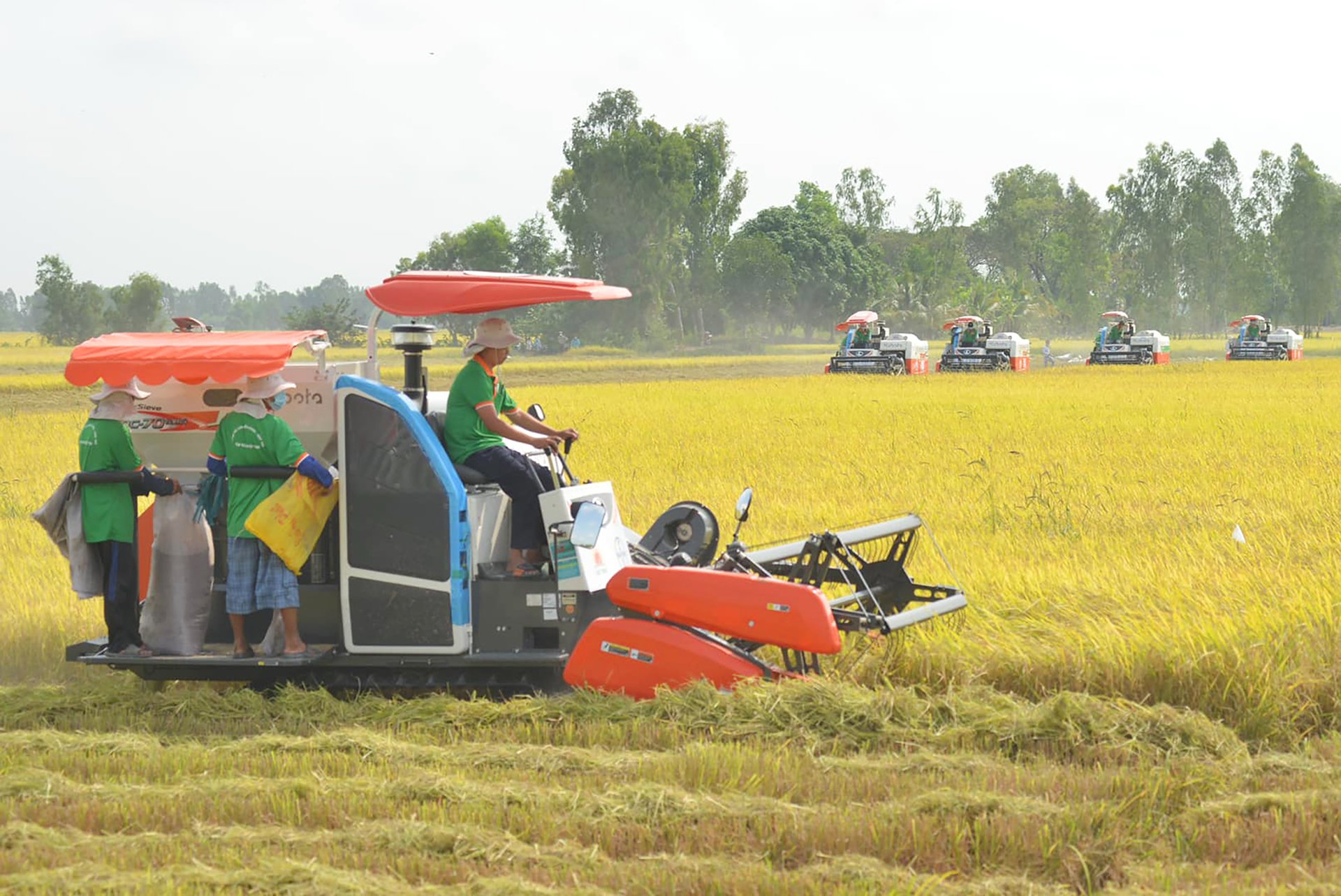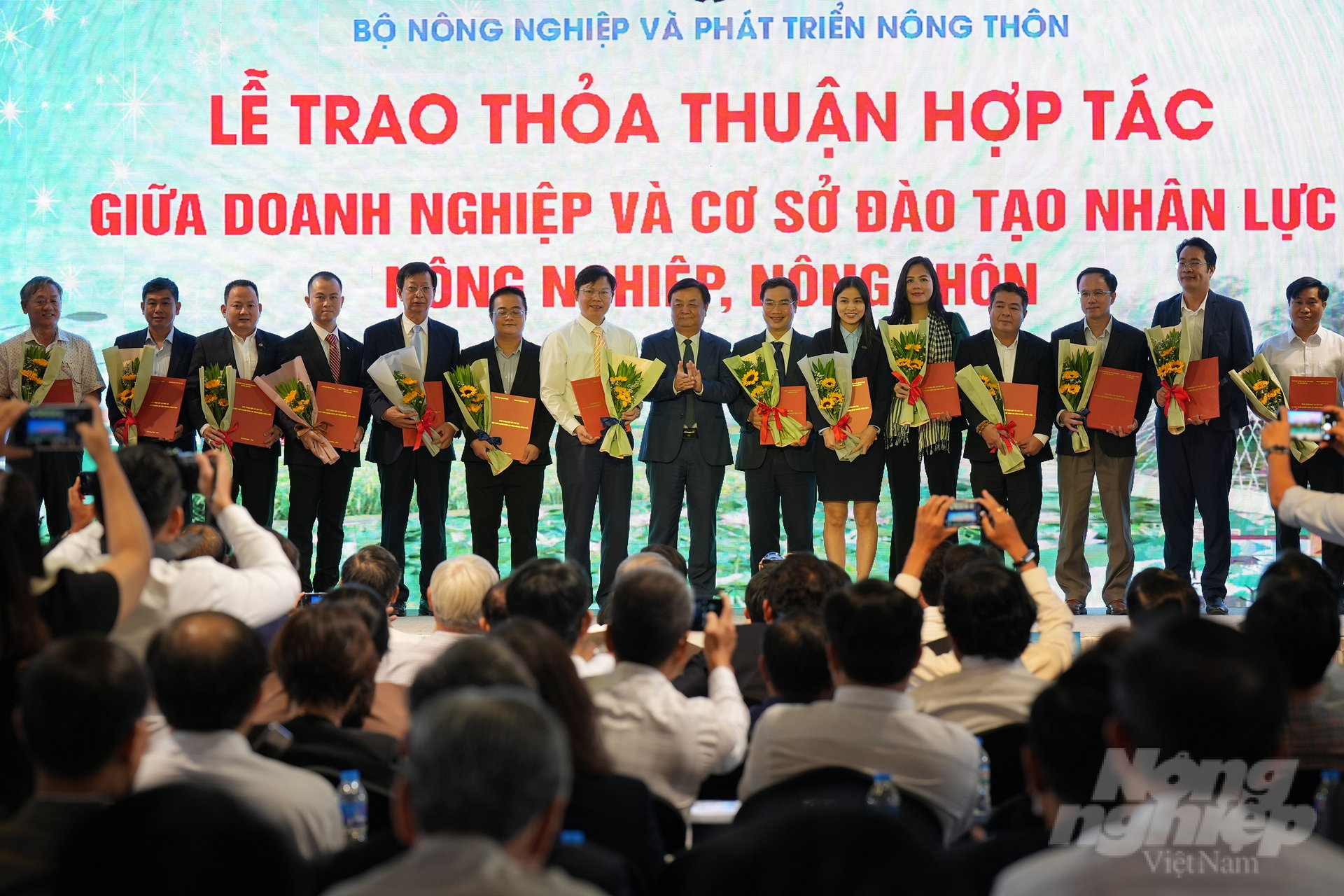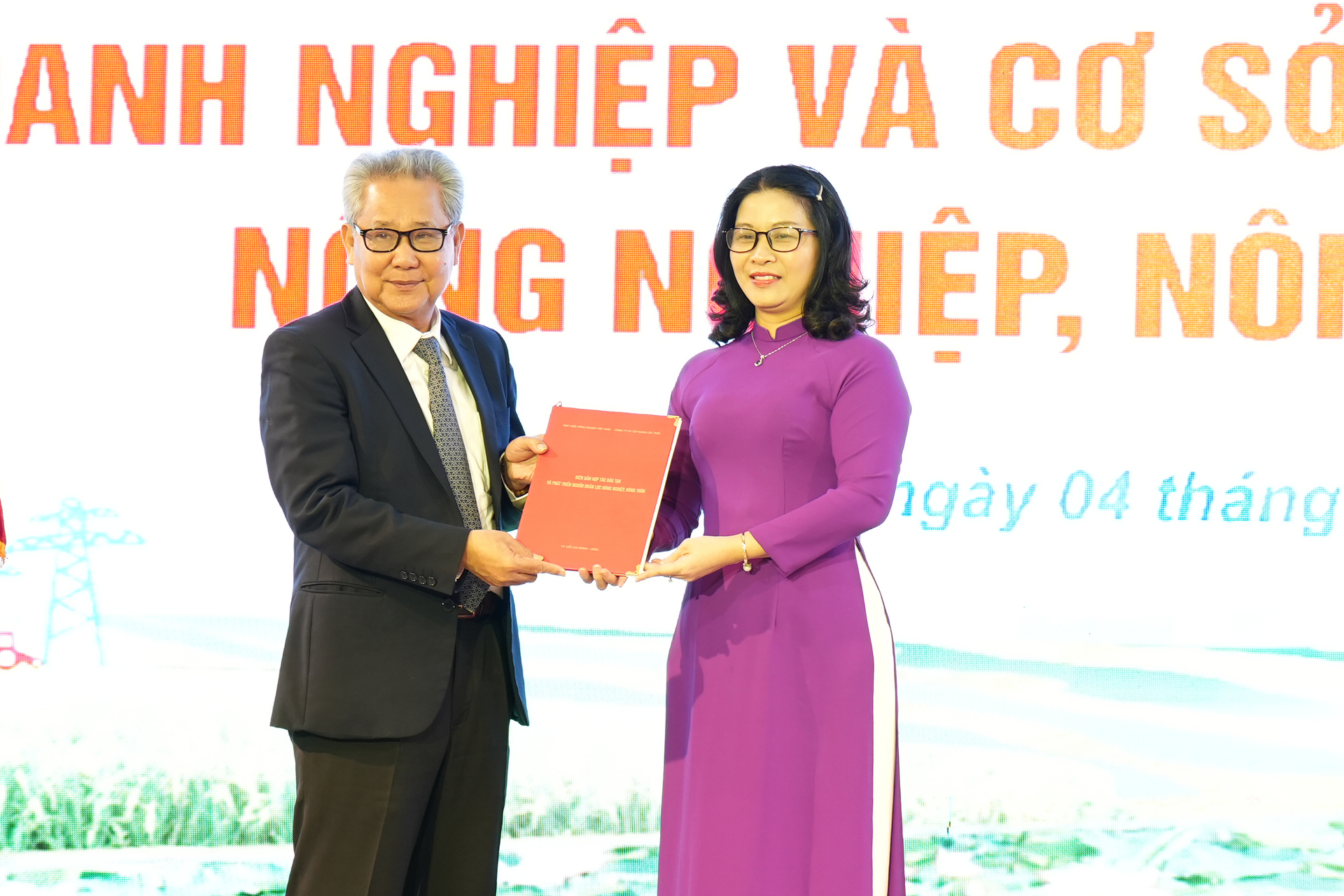May 20, 2025 | 13:36 GMT +7
May 20, 2025 | 13:36 GMT +7
Hotline: 0913.378.918
May 20, 2025 | 13:36 GMT +7
Hotline: 0913.378.918

Mr. Le Thanh Tung, Deputy Head of the Department of Crop Production, MARD. Photo: Nguyen Thuy.
The conference on " Training and Developing Human Resources for Sustainable Agriculture and Rural Development in the Southern Provinces " organized by MARD on August 4th in Ho Chi Minh City, shared insights on improving the quality of agricultural workforce training. According to Mr. Le Thanh Tung, Deputy Head of the Department of Crop Production under MARD, a survey conducted among 20 companies and cooperatives involved in farming, processing, and aquaculture in the Mekong Delta and the Southeastern region revealed that the trained labor force lacks skills, is slow to adapt, lacks creativity, and lacks practical experience.
Regarding skilled and unskilled laborers, they lack knowledge of occupational safety, discipline, and work ethic…
Therefore, according to Mr. Tung, in order to meet the demand for agricultural human resources in the coming period, it is necessary to adjust training programs to be suitable for current practical conditions and establish strong connections between businesses and training institutions.
According to Mr. Ngo Minh Long, Head of the Department of Agriculture and Rural Development in Hau Giang province, the number of students enrolling in agricultural majors is currently very low, and the knowledge acquired during their studies is limited when applied to their jobs.

The leadership of the Department of Agriculture and Rural Development of Hau Giang Province believes that currently, the agricultural production mindset is gradually shifting towards an agricultural economic mindset. Therefore, to enhance the quality of post-secondary agricultural education, it is necessary to integrate subjects following the value chain model. It is essential to introduce interdisciplinary subjects into the curriculum that still serve agriculture, such as tourism-agriculture, mechanics-agriculture, economics-agriculture, management-agriculture, commerce-agriculture, digital technology-agriculture, electricity-agriculture, logistics-agriculture, and more.
In addition, within the training program, students should understand the value of their field of study for human life and have a deep understanding of the profession, thereby cultivating a passion for their future careers.
The training program should also focus on providing soft skills and practical experience, such as increasing the value of agricultural products, establishing organizational management plans, developing and improving processes to enhance productivity and quality through clean and safe production, traceability, and building agricultural product brands to compete in the market.
For vocational training in rural labor, Mr. Ngo Minh Long believes that it is necessary to conduct surveys, orientation, and develop vocational training plans that serve regional development. From there, trained labor can be provided to the industry and services.
"When preparing textbooks for vocational training in rural labor, it is imperative to emphasize the spirit of career orientation, entrepreneurship, the establishment of careers, and focus on building new rural areas and developing modern agriculture in Vietnam," suggested Mr. Ngo Minh Long.

At the meeting, a cooperation agreement ceremony took place between businesses and agricultural and rural human resource training institutions. Photo: Phuc Lap.
From the association's perspective, Ms. Ly Kim Chi, Chairwoman of the Food and Foodstuff Association (FFA), stated that the supply of labor for food processing enterprises is currently insufficient and unable to meet the requirements of modern production, especially international standards. Graduates cannot be directly employed without additional training. Particularly in the current context, when customers come from foreign countries such as Japan, China, and the EU, they demand that workers possess knowledge of machine operation procedures, production processes complying with international quality standards such as ISO, HACCP, and specialized international language skills.
Furthermore, deep-rooted psychological barriers and prejudices regarding traditional agriculture, which is perceived as arduous with low income, have led to a severe shortage of high-quality human resources in the field of agriculture in Vietnam. Meanwhile, the demand for this workforce is increasing, and this situation significantly affects the quality of raw materials for food processing and hinders the long-term development of the food processing industry.
"Although the current education and training of human resources have achieved significant progress, it has not been truly effective and fails to meet the needs and expectations of businesses. Many programs currently focus more on theoretical knowledge and lack practical skills and experience. The teaching programs and methods of training institutions cannot keep up with the trends and development demands of the industry. Limited cooperation between training institutions and businesses hampers practicality and educational orientation for the sector, making it difficult for graduates to apply their knowledge in the business environment, requiring companies to retrain them," highlighted Ms. Ly Kim Chi.
According to Ms. Chi, it is necessary to build and strengthen close and sustainable relationships between training institutions and businesses to develop human resources in the agricultural and food processing sectors.
Mrs. Chi also confirmed that the Food and Foodstuff Association and businesses will always collaborate with the MARD in enhancing the quality of human resources in the agricultural sector and food processing. This will be achieved by strengthening cooperation with educational institutions and supporting scientific research organizations to create employment opportunities for graduates.

Loc Troi Group signed a cooperation agreement with the Vietnam National University of Agriculture. Photo: Phuc Lap.
Mr. Huynh Van Thon, Chairman of the Board of Directors of Loc Troi Group, stated that in their 30-year journey of "sustainable development with farmers," Loc Troi has always been concerned about human resources. They allocate a budget of 3.5 - 4 million USD for research, but for the past three years, they haven't fully utilized it. Thus, there is still room for Loc Troi to collaborate with educational institutions.
The Chairman of the Board of Directors of Loc Troi Group stated that in the upcoming development strategy, Loc Troi is concerned about training high-quality human resources, especially workers over 40 years old from industrial enterprises in major cities.
"This team is well-suited to Loc Troi in terms of training and retraining for the agricultural mechanization specialization. We have allocated a budget of 400,000 - 500,000 USD to train this group, as mechanization requires skilled hands and people who can use modern machinery and equipment, embracing Industry 4.0 and digital transformation. Therefore, we earnestly invite and are willing to collaborate with educational institutions to help us develop this workforce," said Mr. Huynh Van Thon, emphasizing his desire to bring engineers to rural areas to live and dine with farmers, to listen to the breath of the fields and understand the sentiments of the farmers. This also means that these individuals will become officers who contribute to the development of rural areas.
In the upcoming period, Loc Troi will also collaborate with institutes and schools to establish regular updating programs and provide training and retraining to connect young individuals with agricultural cooperatives and organizations in rural areas. This approach aims to maximize social effectiveness and enable them to independently cover a fundamental part of their income.
According to Mr. Thon, in the upcoming strategy, Loc Troi will delve into post-harvest processing and, especially, focus on creating added value from rice crops such as straw, husks, bran, etc., "without wasting anything." Therefore, Mr. Thon invites scientists, managers, institutes, and schools to collaborate with Loc Troi in training the workforce to enhance the value added from rice crops.
Similarly, Mr. Nguyen Chanh Phuong, Vice Chairman of the Handicraft and Wood Industry Association of Ho Chi Minh City (HAWA) believes that to achieve sustainable development in the forestry and wood processing industry in the future, it is necessary to strengthen cooperation between associations, businesses, and schools or institutes in developing the workforce for the sector. At the same time, schools need to have detailed outlines to contribute to the development of the workforce in forestry and wood processing, turning them into modern farmers in the future.
Translated by Nguyen Hai Long

(VAN) In 2024, over 295 million people across 53 countries and territories faced acute hunger—an increase of almost 14 million people compared to 2023, while the number of people facing catastrophic levels of hunger reached a record high.

(VAN) World Environment Day 2025 (June 5) carries the theme 'Beat Plastic Pollution' continuing to emphasize the global urgency of addressing the plastic waste crisis.

(VAN) This was the assessment shared by experts at the workshop titled 'Assessing the Role and Potential of Low-Emission Rice Production Systems in Vietnam,' held on the morning of May 19.

(VAN) Cai Rong Port is the fisheries control center of Quang Ninh, helping to monitor fishing vessels, combat IUU fishing, and remove the EC's 'yellow card'.

(VAN) The German Agricultural Society (DLG) explores the possibility of establishing a mechanization service center in Vietnam’s Mekong Delta to support farmers in accessing and utilizing advanced machinery.

(VAN) On May 16, the Department of Water Resources Management, in collaboration with the Food and Agriculture Organization of the United Nations (FAO), held a signing ceremony for the GEF-8 project document.

(VAN) Food safety, mechanization, vocational training, and market opening are key areas of cooperation expected between the Vietnamese Government and the Federal Republic of Germany.